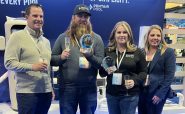Dominick Montanaro remembers when freshwater giants patrolled the waters of his old neighborhood near Ft. Lauderdale, Fla.
“The canals there used to be crystal clear,” says the owner of M&M Pools in Satellite Beach, Fla. “I would see tarpon that were 7 or 8 feet long swimming in some of those waterways. You’d see snook just rolling around — you’d see all kinds of great fish.”
Thirty years later, however, the view is quite different. Though they still access the ocean, many of the inlets of South Florida have been heavily developed, and the use of fertilizers and pesticides has only exacerbated the impact on the local environment.
The result is an erosion of the area’s natural habitat — an ecosystem that supports native plant and animal life that once thrived in this tropical paradise.
“You go down there now and there’s nothing swimming in those canals,” Montanaro says. “At least, nothing you’d want to catch and eat.”
But Montanaro, a board member and past president of the Florida Swimming Pool Association, has never been one to occupy the sidelines. About a year ago, he joined an effort to create a new generation of coastal stewards. Called Anglers for Conservation, the Satellite Beach-based organization promotes local fishing education, habitat restoration and conservation science as a means of preserving the natural environment.
The group was founded in 2007 by Rodney Smith, an accomplished sport fisherman and publisher of Coastal Angler Magazine. He also happens to live a few doors down from Montanaro on Florida’s east coast, and the two have been friends for many years.
So there was little hesitation when Smith approached Montanaro, a former city councilman and longtime member of multiple community boards, about becoming involved.
In addition to serving on the group’s board as secretary, Montanaro is chairman of its Hook Kids On Fishing program. The program hosts activities for kids and parents to learn basic catch-and-release fishing skills, as well as how to properly care for local canals, streams, coastal areas and wetlands. It includes clinics on casting, conservation, fishing habitat and biology, knot-tying, release techniques, and fishing with professional guides. Free rods, reels and tackle boxes also are frequently provided.
“When it comes to preserving our waterways and our fisheries — unless you can impart this knowledge to the younger generations, they’re not going to have any appreciation for it,” Montanaro says.
Indeed, in late September the group held its third annual Punta Gorda Hook Kids On Fishing event at the local Fisherman’s Village, a harbor-side shopping mall, marina and resort.
Moving forward, Montanaro foresees taking Hook Kids On Fishing coast to coast. He and fellow board members have been developing standards and policies to establish it as a national program. For example, interested participants soon will complete an application that includes details such as sponsors, permits, facilities, access to fishing guides and educational components.
The goal is to have that packet in place by January 2011, Montanaro says, adding that membership and visibility statewide remain top priorities at the moment.
And while he’s having fun with the young organization, there’s little doubt as to Montanaro’s principal motivation.
“I’ve always had an appreciation for our environment,” he says. “So it’s definitely personal. We’re all advocates for our industry, and I’m trying to be an advocate for what we do here with Anglers for Conservation.”




